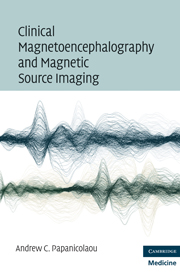Book contents
- Frontmatter
- Contents
- Contributors
- Preface
- Section 1 The method
- Section 2 Spontaneous brain activity
- Section 3 Evoked magnetic fields
- Postscript: Future applications of clinical MEG
- Overview
- Normal aging and neurodegenerative disorders
- Neurodevelopmental disorders
- Psychiatric disorders
- Neurological disorders
- Functional reorganization
- References
- Index
Psychiatric disorders
from Postscript: Future applications of clinical MEG
Published online by Cambridge University Press: 01 March 2010
- Frontmatter
- Contents
- Contributors
- Preface
- Section 1 The method
- Section 2 Spontaneous brain activity
- Section 3 Evoked magnetic fields
- Postscript: Future applications of clinical MEG
- Overview
- Normal aging and neurodegenerative disorders
- Neurodevelopmental disorders
- Psychiatric disorders
- Neurological disorders
- Functional reorganization
- References
- Index
Summary
Schizophrenia
Early applications of whole-head MEG revealed the presence of increased slow-wave activity in temporoparietal regions among small samples of patients with schizophrenia. Over the course of several systematic studies, investigators also used MEG and substantially larger sample sizes to verify the incidence of abnormally high slow-wave activity in patients with schizophrenia in contrast to nonpsychotic individuals. Fehr and coworkers reported that relative to nonpsychotic controls, patients with schizophrenia exhibited enhanced delta and theta band activity localized in posterior and frontotemporal regions. Importantly, this study also revealed that positive symptom scores varied as a function of delta and theta activity in the frontal regions, a finding that suggested that focal abnormal slow-wave activity may be a defining feature of schizophrenia. In another sample of schizophrenic patients, these authors reported observing focal increases in delta and theta activity within the parietal and temporal areas, with slow waves in the latter region significantly correlating to negative symptoms. The potential diagnostic value of slow-wave localization was further highlighted by Wienbruch and coworkers. They also found elevated delta and theta activity in temporal and parietal regions in schizophrenic patients that significantly correlated with measures of auditory hallucinations and differentiated these patients from individuals with major depression. More recently, these findings were replicated by Rockstroh and associates, who further stressed the diagnostic potential of MEG in psychosis.
- Type
- Chapter
- Information
- Clinical Magnetoencephalography and Magnetic Source Imaging , pp. 183 - 185Publisher: Cambridge University PressPrint publication year: 2009



